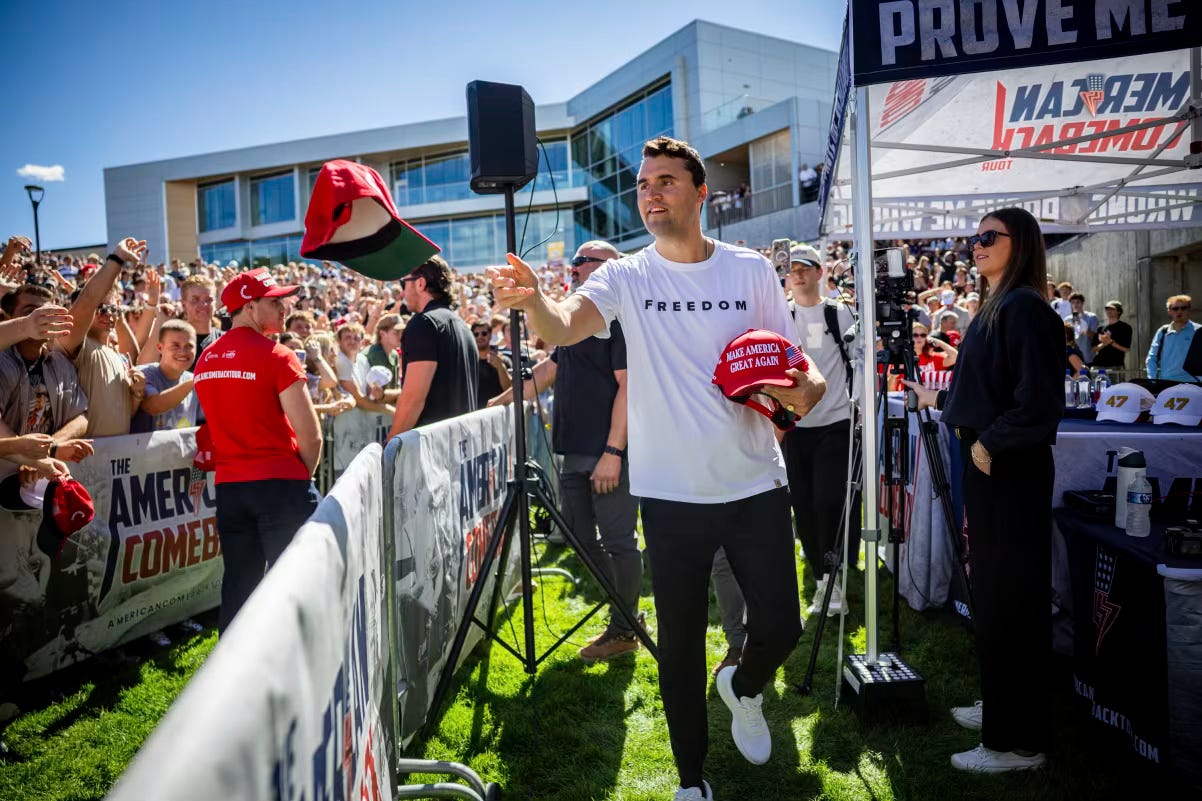A Modern Martyr and the Need for Courage
What Charlie Kirk’s Death Demands from the Rest of Us
In reflecting on the death of Charlie Kirk, I’ve been carrying a heavy heart. No, I didn’t know Charlie personally, but for some reason his assassination hit me in the gut. It wasn’t just shocking—it felt personal. Like many of you, I have watched many of his videos, followed his career online, and even attended a few of his Turning Point USA events. But I wasn’t prepared for the stomach-turning effect of seeing him murdered in 4K on X.
For the last day or so, I’ve been trying to make sense of my feelings. I know we all have. After all, we’re not living in a war-torn region of Europe or the Middle East. We’re here. In America. And somehow, on a sunny day in Utah, a 31-year-old father of two was professionally assassinated in front of thousands of people, including his wife and children.
In a haunting interview just 2 months ago, Charlie was asked, “How do you want to be remembered?” His answer was simple: “I want to be remembered for courage in my faith.” Now, he could’ve said “building an organization” or “winning political debates,” or “being friends with the president.” All of that would have been true. But instead he said courage. And specifically courage tied to his faith.
Wow.
When I heard that I couldn’t help but think of the heroes mentioned in Hebrews chapter 11—the chapter we call the “Hall of Faith” chapter. These were men and women who trusted God in impossible situations. People who endured mocking, torture, prison, and death—all because they refused to stay silent about what they believed. The writer of Hebrews even says, “the world was not worthy of them.”
I believe Charlie Kirk now stands in that long line. Not as a perfect man. Not as a saint. But as a modern martyr. Like Jim Elliot, who died on the mission field in Ecuador. Like Dietrich Bonhoeffer, executed for resisting the evil of Nazi Germany. Like Cassie Bernall, the teenage girl in Columbine who reportedly said “yes” when asked if she believed in God—and was killed for it.
When faced with the choice between life or truth, they all chose truth.
Even if truth meant death.
In July 2024, my wife and I attended Charlie’s TPUSA Believers Summit in West Palm Beach. We saw Charlie interview several guests and deliver a phenomenal speech, eventually introducing Donald Trump as a special guest speaker—just months before he would become our 47th president. But what we saw wasn’t just a political pundit or an activist. We saw a strong Christian. Charlie’s faith wasn’t a side note; it was central. He didn’t wrap the gospel in political slogans or hide it behind clever branding. He led with it—over and over again.
He believed politics had a place—but that Christ must reign over all. And that’s what makes this loss so difficult. We didn’t just lose a voice. We lost a witness.
There’s an memorable line in Star Wars: A New Hope. It’s one I can’t stop thinking about. Ben Kenobi faces Darth Vader in a light saber duel and says to him, “If you strike me down, I will become more powerful than you can possibly imagine.” Strange how true that’s becoming of Charlie Kirk. His voice, momentarily silenced by a bullet, is now echoing louder than ever, and especially among young people.
I'm seeing it everywhere. Students, leaders, even quiet Christians who’ve been watching from the sidelines are stepping up and speaking out. They are picking up the mic Charlie dropped and saying, “It’s my turn now.” And it’s not just to argue politics, but to speak boldly across enemy lines, with the truth of Christ.
Let’s be honest. We’ve been a generation that expects faith to feel good all the time. We’re shocked when it costs us something. But Christianity has never been comfortable. It’s always been costly.
Right now, we need more believers willing to say, “Even if it costs me everything, I will not back down.” Think of John the Baptist, who lost his head for telling the truth. Or 11 out of 12 apostles who were martyred because they couldn’t keep quiet about the gospel.
Remember, Charlie Kirk didn’t die because he was chasing influence, fame or money. He died because he refused to trade truth for safety.
So yes, I’m grieving. But I’m also resolved. I want to honor Charlie’s legacy and I can’t do that by softening my message or retreating into silence. We honor him by living the way he died: unashamed of Christ, willing to speak the truth with boldness, confidence, and grace. Not with anger or vengeance, but with clarity and conviction.
If Charlie’s death teaches us anything, it’s that courage may cost us everything, but silence costs even more.





Thank you again for speaking out when most pastors won’t.
Beautifully said. Well done and thank you.